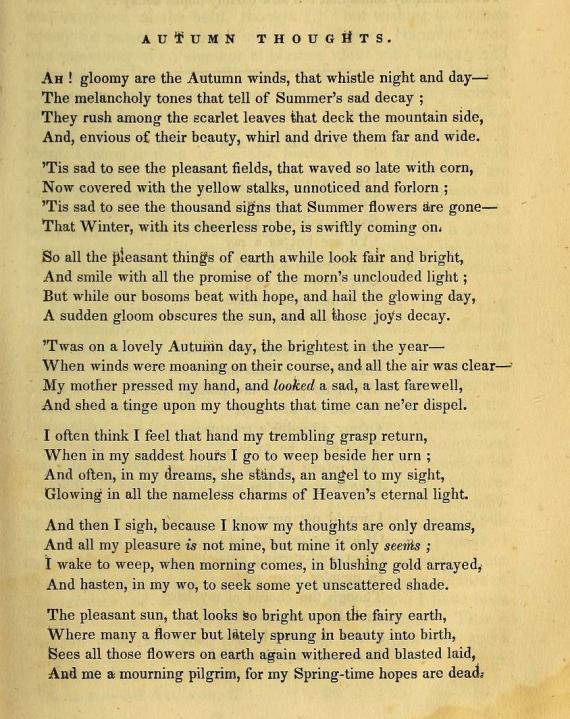ANONYMOUS, “Autumn Thoughts,” The Boston Literary Magazine, November
1832
ANONYMOUS, “Autumn Thoughts,” The Boston Literary Magazine, November
1832
AUTUMN THOUGHTS
Ah! gloomy are the Autumn winds, that whistle night and day—
The melancholy tones that tell of Summer’s sad decay;
They rush among the scarlet leaves that deck the mountain side,
And, envious of their beauty, whirl and drive them far and wide.
‘Tis sad to see the pleasant fields, that waved so late with corn,
Now covered with the yellow stalks, unnoticed and forlorn;
‘Tis sad to see the thousand signs that Summer flowers are gone—
That Winter, with its cheerless robe, is swiftly coming on.
So all the pleasant things of earth awhile look fair and bright,
And smile with all the promise of the morn’s unclouded light;
But while our bosoms beat with hope, and hail the glowing day,
A sudden gloom obscures the sun, and all those joys decay.
‘Twas on a lovely Autumn day, the brightest in the year—
When winds were moaning on their course, and all the air was clear—
My mother pressed my hand, and looked a sad, a last farewell,
And shed a tinge upon my thoughts that time can ne’er dispel.
I often think I feel that hand my trembling grasp return,
When in my saddest hours I go to weep beside her urn;
And often, in my dreams, she stands, an angel to my sight,
Glowing in all the nameless charms of Heaven’s eternal light.
And then I sigh, because I know my thoughts are only dreams,
And all my pleasure is not mine, but mine it only seems;
I wake to weep, when morning comes, in blushing gold arrayed,
And hasten, in my wo, to seek some yet unscattered shade.
The pleasant sun, that looks so bright upon the fairy earth,
Where many a flower but lately sprung in beauty into birth,
Sees all those flowers on earth again withered and blasted laid,
And me a mourning pilgrim, for my Spring-time hopes are dead.
Then haste, ye Autumn days, away! ye have no charm for me,
Ye harrow up ten thousand things of painful memory;
My bosom cannot bear the weight of wo ye make me feel;
Oh! if ye stay, I would my breast were hardened into steel!
I cannot bear the thoughts that come upon my feverish brain,
And, often as I drive them back, return in grief again;
Oh ! gloomy are the Autumn winds that whistle night and day,
The melancholy tones that tell how earthly hopes decay!
Boston Literary Magazine, November 1832

